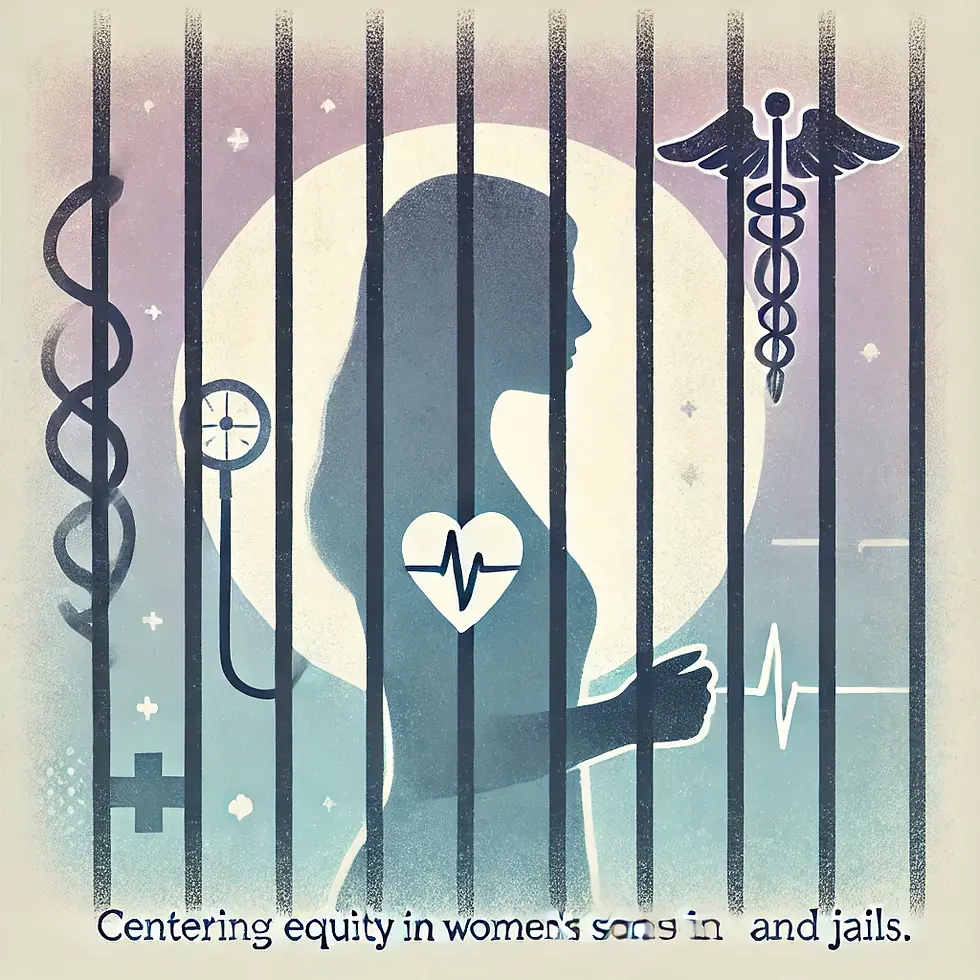Reproductive Injustice: How jails and prisons violate the reproductive rights of incarcerated women.
- Swop Behind Bars

- 12 minutes ago
- 3 min read

It started with cramps. Sharp, low in her abdomen, coming in waves. Tasha had told the nurse two days earlier that something didn’t feel right, that the pain was getting worse, but the guard had shrugged it off. “You’re probably just constipated,” he said, not even looking up from his clipboard.
Tasha was six months pregnant and incarcerated in a county jail for a probation violation tied to an old shoplifting charge. She was 27, Black, and already a mother of two. This was her third pregnancy—but the first one behind bars.
When the bleeding started, she banged on the metal door of her cell for almost an hour before anyone responded. When they finally took her to the infirmary, she was handcuffed. Even as she doubled over in pain. Even as she begged them not to put the restraints on.
By the time she was transferred to the hospital, still cuffed at the wrists and ankles, she was in active labor. She gave birth alone, under fluorescent lights, surrounded by uniformed officers instead of family. Her baby lived just long enough for her to hold him once.
No one asked if she wanted to name him. No one offered grief counseling. No one followed up. Two days later, she was back in jail, and no one spoke of it again.
When a woman is incarcerated, she doesn’t give up her humanity. She doesn’t give up her right to healthcare. And she certainly doesn’t give up the right to make decisions about her own body. Yet across prisons and jails in the U.S., reproductive injustice is a daily reality for thousands of women—many of whom have already survived poverty, violence, and systemic neglect long before they were ever locked up.
Reproductive justice, as defined by Black women activists and scholars, is about more than the right to abortion. It’s the right to have children, not have children, and to parent the children we have in safe and sustainable communities. Inside carceral settings, these rights are systematically denied.
Denied Autonomy, Delayed Care
Incarcerated women often face severe obstacles to accessing reproductive health care. Routine gynecological services like Pap smears, STI testing, and contraception are inconsistently offered—if at all. In some facilities, women have been forced to wait weeks or months for urgent exams or treatments, leaving potentially life-threatening conditions undiagnosed.
When it comes to contraception, some women are denied access altogether, while others are pressured into receiving long-acting reversible contraceptives (LARCs) or sterilization without full consent. This creates a disturbing echo of past abuses, where poor women and women of color were targeted for state-sanctioned reproductive control.
Pregnancy in Shackles
The reproductive injustice reaches a harrowing peak during pregnancy. Pregnant incarcerated women are routinely shackled during labor and delivery, despite widespread condemnation of this practice and legislation banning it in many states. The use of restraints can cause physical harm, obstruct necessary medical care, and deeply traumatize both the pregnant person and their newborn.
And prenatal care? Often substandard. Pregnant women report inconsistent access to vitamins, ultrasounds, nutrition, and emotional support. Some are denied access to abortion care altogether—especially in states where carceral policies mirror restrictive state laws. Others are forced to navigate a bureaucratic maze to access reproductive services, while their bodily clock ticks without mercy.
Forced Separation and Loss
The injustice doesn’t end at birth. Incarcerated mothers are almost always separated from their newborns within days—or hours—of delivery. The trauma of this forced separation is immense, often compounding existing mental health challenges and making the postpartum period even more dangerous.
Moreover, very few correctional institutions have policies that support family unity, parenting support, or breastfeeding. The needs of mothers are ignored. The needs of infants are disregarded.
A System Rooted in Control, Not Care
What all of this points to is not just a failure of healthcare policy, but a deeper, structural problem: a system designed to control, rather than care for, incarcerated women. A system that still sees poor women—especially Black, brown, and Indigenous women—as undeserving of reproductive freedom or bodily autonomy.
To truly address reproductive injustice in prisons and jails, we must look beyond the prison walls. This is about public health, racial justice, and gender equity. It’s about dismantling a legacy of medical neglect and reproductive control, and building systems that affirm the right of every woman—free or incarcerated—to make choices about her own body with dignity and without fear.
What Comes Next
In our next post, we’ll explore what happens when a woman is pregnant behind bars, and how lack of prenatal care and systemic neglect can turn pregnancy into a life-threatening ordeal.
Because the fight for reproductive justice doesn’t stop at clinic doors or courtrooms—it must also reach the most hidden corners of our justice system.




Comments